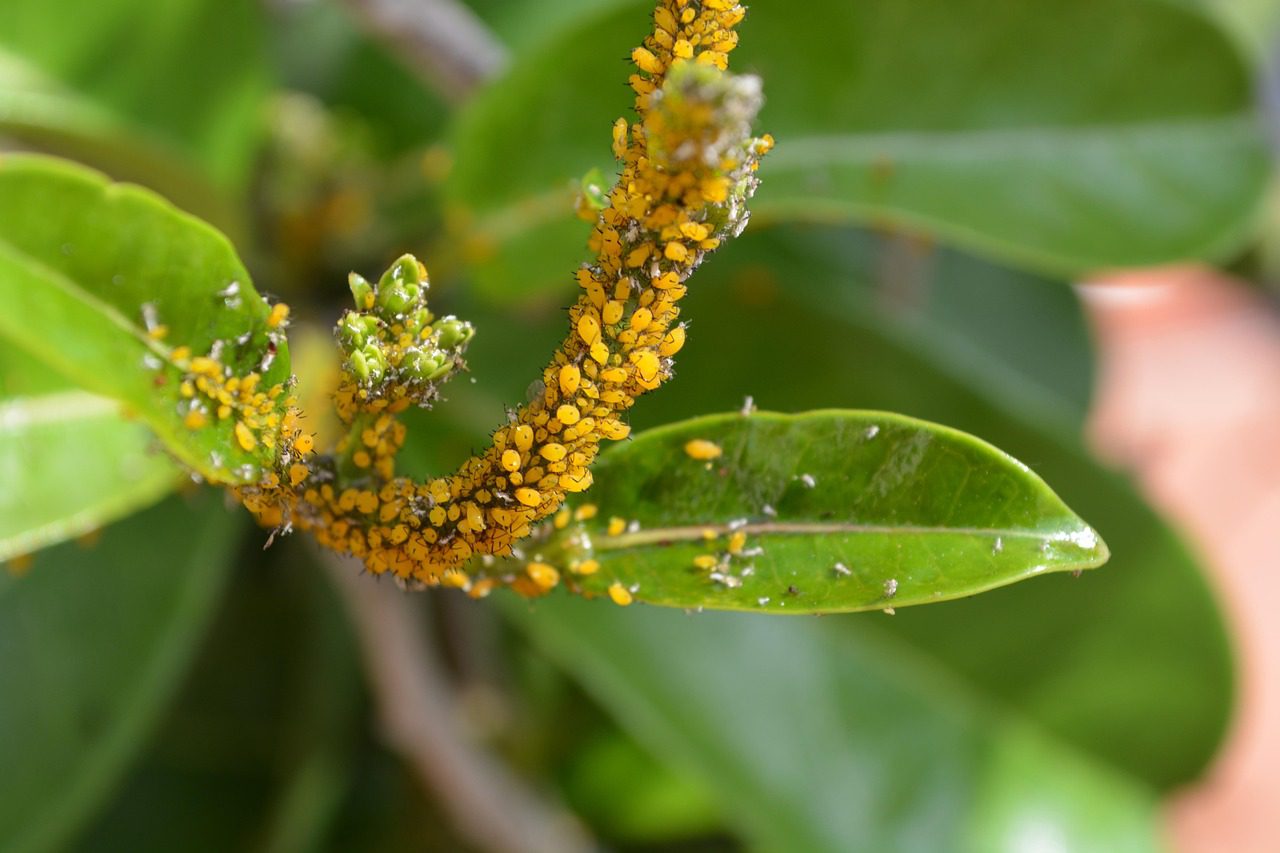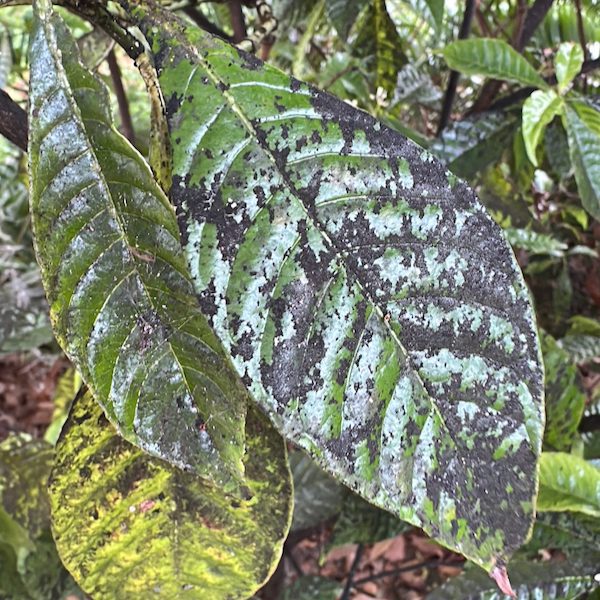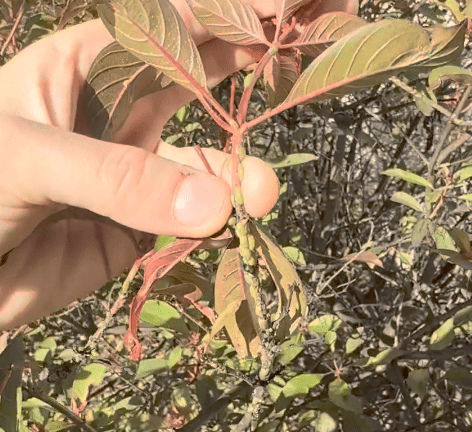
Keeping your garden thriving without harsh chemicals is easier than you think! With organic pest control methods, you can protect your plants naturally while supporting biodiversity. Discover the best ways to manage pests using beneficial insects, Florida native plants, and homemade natural sprays.



Creating a Balanced Ecosystem in Your Garden
Why Choose Organic Pest Control?
Chemical pesticides may offer quick fixes, but they can disrupt ecosystems and harm pollinators. Organic solutions, on the other hand, create a balanced, self-sustaining garden that reduces pests naturally over time.
1. Encourage Beneficial Insects 🐞
Nature provides its own pest control through predatory insets that feed on harmful bungs. Consider introducing or attracting:
- Ladybugs – Feast on aphids and soft-bodied pests.
- Lacewings – Their larve consumes aphids, caterpillars and mealybugs.
- Parasite Wasps – Help control caterpillars, whiteflies and beetle larvae.
💡Tip: Grow plants like dill and fennel, among other native plants to invite beneficial insects to your garden.
2. Native Plants: A Natural Defense 🌱
Florida’s native plants have evolved alongside local pests, making them naturally resilient. Some also attract predator insects. Recommended varieties
- Spotted Beebalm aka Dotted Horsemint (Monarda punctata) – Attracts parasitic wasps, hoverflies, and predatory beetles.
- Goldenrod (Solidago spp.) – Supports a variety of beneficial insects, including parasitic wasps and hoverflies.
- Frogfruit (Phyla nodiflora) – A groundcover that provides nectar for beneficial insects.
- Walter’s Viburnum (Viburnum obovatum) – Offers nectar for beneficial insects and shelter for predators.
- Yarrow (Achillea millefolium) – Supports predatory wasps and ladybugs.
- Black-eyed Susan (Rudbeckia hirta) – Attracts parasitic wasps and predatory flies.
- Narrowleaf Sunflower (Helianthus angustifolius) – A late-season nectar source for beneficial insects.
- Elliott’s Aster (Symphyotrichum elliottii) – Provides nectar during fall months when other plants are not in bloom.
- Coreopsis (Coreopsis spp.) – Florida’s state wildflower, supporting beneficial insects year-round.
3. Homemade Organic Sprays 🌿
If infestations get out of hand, try DIY natural solutions:
- Garlic Spray:Deters aphids, caterpillars, and whiteflies. Blend garlic cloves with water and a few drops of dish soap.
- Neem Oil:Disrupts insect growth cycles without harming beneficial bugs.
- Soap Spray:A mix of mild soap and water suffocates soft-bodied insects like mites and thrips.
Garlic Pepper Tea Recipe
This organic pest control spray harnesses the natural properties of garlic and hot peppers to deter pests while being safe for most plants.
Ingredients:
- 2 bulbs of garlic
- 2 hot peppers (jalapeño, cayenne, or habanero)
- Water
Instructions:
- Blend the garlic and peppers in a food processor with half to two-thirds full of water.
- Strain the liquid and transfer it to a 1-gallon container.
- Fill the container with water to create a concentrated mixture.
- To use, mix 1/4 cup of the concentrate with 1 gallon of water and spray onto plants using a handheld sprayer.
Garlic Tea Recipe
For a milder option, omit the peppers and increase the garlic. Adding 2 tablespoons of molasses can help the mixture adhere to plant surfaces better.
💡 Tip: Always test homemade sprays on a small section of plants before full application.
4. Companion Planting for Pest Control 🌼
Some plants naturally repel pests while benefiting nearby crops:
- Marigolds– Discourage nematodes and aphids.
- Basil– Repels mosquitoes and flies.
- Chives & Garlic– Keep aphids and mites at bay.
💡 Tip: Using native plants increases functionality and they are easier to integrate and maintain. Learn more in our FAQ below.
5. Creating a Balanced Garden Ecosystem 🏡
Pests thrive in stressed environments. A healthy garden is the best defense! Maintain soil health by:
- Addingorganic mulch to retain moisture and deter pests.
- Practicingcrop rotation to reduce soil-borne diseases.
- Keeping adiverse plant selection to support natural pest predators.
Conclusion
A pest-free garden doesn’t require harsh chemicals! By integrating beneficial insects, native plants, and organic sprays, you’ll cultivate a healthier, more sustainable landscape. Ready to transform your garden naturally? Want to learn more? 🌿✨ Tap here to email questions.
Organic Pest Control for a Healthy Garden
FAQs
1. What is organic pest control, and why should I use it?
Organic pest control involves using natural methods—like beneficial insects, native plants, and homemade sprays—to manage garden pests. Unlike chemical pesticides, these solutions support biodiversity, protect pollinators, and promote long-term soil and plant health.
2. How do beneficial insects help with pest control?
Beneficial insects prey on common garden pests, reducing infestations naturally. For example, ladybugs eat aphids, lacewing larvae devour caterpillars, and parasitic wasps control whiteflies and beetles. Planting dill, goldenrod, and dotted horsemint can help attract them.
3. Are there Florida native plants that naturally deter pests?
Yes! Some Florida native plants attract beneficial insects that keep pest populations in check. Examples include:
- Dotted Horsemint (Monarda punctata) – Attracts predatory wasps.
- Goldenrod (Solidago spp.) – Supports ladybugs and lacewings.
- Frogfruit (Phyla nodiflora) – A low-maintenance ground cover that promotes biodiversity.
4. What are the best homemade sprays for pest control?
Try these natural, DIY solutions:
- Garlic Spray – Repels aphids, caterpillars, and whiteflies. Blend garlic cloves with water and a drop of dish soap.
- Neem Oil Spray – Disrupts insect growth cycles without harming beneficial bugs.
- Soap Spray – A mix of mild soap and water suffocates soft-bodied insects like mites and thrips.
💡 Tip: Always test a small area of your plant before applying any spray widely.
5. Will parasitic wasps harm butterfly caterpillars?
Parasitic wasps can target caterpillars, including those of butterflies. To mitigate this, plant extra host plants for butterflies to ensure a thriving population despite natural predation.
6. How can I create a pest-resistant garden naturally?
- Grow a variety of companion plants (e.g., marigolds deter nematodes, basil repels mosquitoes).
- Improve soil health with organic mulch and crop rotation to reduce pests.
- Maintain plant diversity to encourage a balanced ecosystem.
7. What Florida Native Plants Are Good Companion Plants That Repel Pests and Mosquitoes?
1. Dotted Horsemint (Monarda punctata) 🌿Repels: Mosquitoes and some herbivorous insects; Attracts: Predatory wasps that control caterpillars and beetles
2. Goldenrod (Solidago spp.) 🌾Repels: Aphids and certain leaf-eating insects; Attracts: Lacewings, ladybugs, and parasitic wasps
4. Frogfruit (Phyla nodiflora) 🌱Repels: Some pest insects by providing ground cover; Attracts: Pollinators and beneficial insects
5. Beautyberry (Callicarpa americana) 🍇 Repels: Mosquitoes naturally with its leaves; Can be crushed and rubbed on the skin as a natural repellent
6. Calamint (Calamintha spp) 🍃 In the Garden: Planting calamint in your garden can help deter mosquitoes and other pests naturally. The strong aroma of the plant acts as a barrier, reducing the presence of unwanted insects.
💡 Tip: Plant these species near vegetable gardens or outdoor seating areas to naturally deter pests while creating a biodiverse, thriving garden.
8. Can I use organic pest control for edible plants?
Yes! Natural sprays like garlic spray and neem oil are safe for food crops when used correctly. Rinse produce before consuming to remove any residue.
9. When are pests most active in Florida?
In Florida’s warm climate, pests can be active year-round, but peak activity varies by season:
- Spring & Summer (March–September): Higher temperatures and humidity create ideal conditions for aphids, whiteflies, thrips, and caterpillars. Mosquitoes and fungal diseases also thrive.
- Fall (October–November): Cooler weather slows some pests, but armyworms, mealybugs, and scale insects remain active.
- Winter (December–February): While pest activity decreases, mild winters allow spider mites, whiteflies, and certain beetles to persist.
💡 Tip: Implement preventative pest control early in the season to reduce infestations before they peak.
10. Does temperature influence the effectiveness of homemade pest controls?
Yes! Temperature plays a crucial role in how well natural pest control methods work:
- Hot Weather (Above 85°F): Some sprays, like neem oil and soap solutions, can cause leaf burn if applied in direct sunlight. It’s best to spray early in the morning or late in the evening.
- Cooler Weather (Below 60°F): Certain oils and microbial solutions (like Bt for caterpillars) may take longer to work due to slower insect metabolism.
- Humidity & Rain: High humidity can dilute or wash away treatments, requiring more frequent applications.
💡 Tip: Always check the weather before applying sprays to ensure optimal effectiveness!
|
|
Thank you for Signing Up |




